QuestionHi, my family just got a new puppy this past summer, a bernese mountain dog and she is now 9 months old. We own three other dogs, a Jack Russell, Golden Retriever, and a Black Lab/Boxer mix (all 4yrs). This puppy enjoys jumping on you once you get in the door, that is also followed by getting ahold of your hand or anything else on you, bitting cloths, and the other day she bit my back. No blood or anything just a mark. She also loves to eat anything and everything! Most recent would be bitting a hole in our carpet down to the wood, eating a cord to plug a camera into a computer, a pill bottle, and according to my sister a snow glob. We put her in our laundry room at night, or when leaving the house, and also if she is being bad. Tell her no and show her what she did wrong and smack the nose. I took her out for a run one day to see if that settled her down, at first she wouldn't run next to me but near the end of the run was running next to me if not a bit in front. But after the run once she got in the house she was still very forceful with people and the other dogs, bitting and jumping on everything. My parents tried taking her to a apple feast around the area to see if that would calm her down but it didn't seem to help. Is there anything better we can do to clam her down, make sure she doesn't get ahold and eat things she should not, and will stop her from bitting and jumping on people all the time. Thanks for your time.
Bethany
AnswerIt is only natural that a puppy resists its crate at first. What the puppy
wants more than anything else is to be others, you, anyone else in the
household, and any other pets. In our modern society, even if we are home,
other things distract us from the attention an uncrated puppy must have. The
only real solution is to crate the dog when you aren't around. The dog may be
happier in its den than loose in the house. It relaxes, it feels safe in its
den. It rests, the body slows down reducing the need for water and relieving
its self. Dogs that have been crated all along do very well. Many of them
will rest in their crates even when the door is open. I think the plastic
ones give the dog more of a safe, enclosed den feeling. Metal ones can be put
in a corner or covered with something the dog can't pull in and chew. Select
a crate just big enough for the full grown dog to stretch out in.
Leave it some toys. Perhaps a Kong filled with peanut butter. Don't leave
anything in the crate the dog might chew up. It will do fine without even any
bedding. You will come home to a safe dog and a house you can enjoy.
A dog that has not been crated since it was little, may take some work.
Start out just putting its toys and treats in the crate. Praise it for going
in. Feed it in the crate. This is also an easy way to maintain order at
feeding time for more than one dog.
The "shut the puppy in a safe room" is a fallacy. Very few houses even have a
safe room. How many of us have a room with a hard surfaced floor and nothing
else? Most rooms have electrical cords to chew if nothing else. In addition
to destroying anything a bored puppy finds to chew, it may choke or have
intestinal blockage from the pieces. I had a friend that left her dog in a
"safe" room. It ate a hole in the floor covering. The safe rooms fail to
give the dog the comfort of the enclosed space their instinct requires. Nor
do they restrict activity extending the time the dog can go without relieving itself.
The key to most behavior problems is approaching things using the dog's natural instincts. Dogs see all the people and dogs in the household as a pack with each having their own rank in the pack and a top dog. Life is much easier if the 2 legged pack members outrank the 4 legged ones. You can learn to play the role of top dog by reading some books or going to a good obedience class. A good obedience class or book is about you being top dog, not about rewarding standard commands with a treat. Start at http://www.dogsbestfriend.com/ For more on being top dog, see http://www.dogbreedinfo.com./topdogrules.htm
Young Labs, which I know best, and other puppies tend to very bad about
biting. You see a litter of them, and all the ones that are awake are biting
another one or themselves. I am not even sure they realize that when they are
alone, if they quit biting, they would quit being bitten. At 3 to 4 months
they are getting their adult teeth, and it seems they spend every waking
moment biting or chewing. One thing you can do at that stage is to knot and wet a piece of cloth. Then freeze it. The cooling will soothe the gums. Only let the puppy have it when you are there to watch it. I maintain a Lab's favorite chew toy is another
Lab. Otherwise they settle for any person they can. They keep hoping to find
one that won't yelp, jerk their hand away, and leave.
You just have to keep on correcting them, hundreds of times, not dozens.
Provide sturdy, safe toys such as Kongs and Nylabones. Avoid things they can
chew pieces off and choke on them. Keep them away from electrical cords.
Crates are essential for most young Labs and other dogs.
The pet stores are full of toys that many dogs will quickly chew up into
pieces they could choke on or cause intestinal blockages. If you are not
there to watch, stick to sturdy stuff such as Nylabones and Kongs. Keep a
close eye on chew toys and quickly discard anything that is coming apart in
pieces. Rawhide is especially bad because it swells after being swallowed.
I don't trust any of the consumable chews. The dogs just gnaw them down to a
dangerous size too quickly. These problems are the worst with, but not
limited to, large, aggressive chewers such as Labs.
Jumping is handled much like biting. Turn your back and step away. In both cases, the dog must fail to get the attention it wants every time, time after time. Even if it occasionally gets a positive response, it will continue. Being consistent will work, but not quickly.

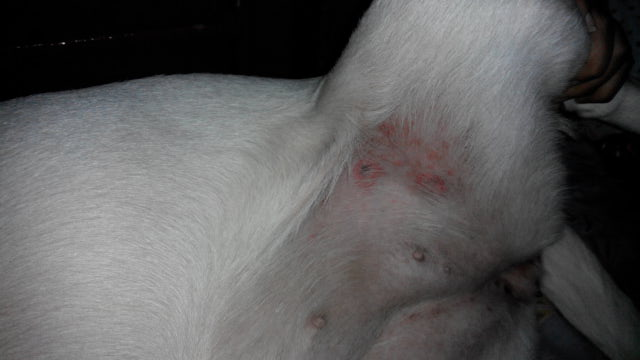 Live worms came out in my dogs poop and he has some rashes?
Question
The Rashes
She is 15 months old and is
Live worms came out in my dogs poop and he has some rashes?
Question
The Rashes
She is 15 months old and is
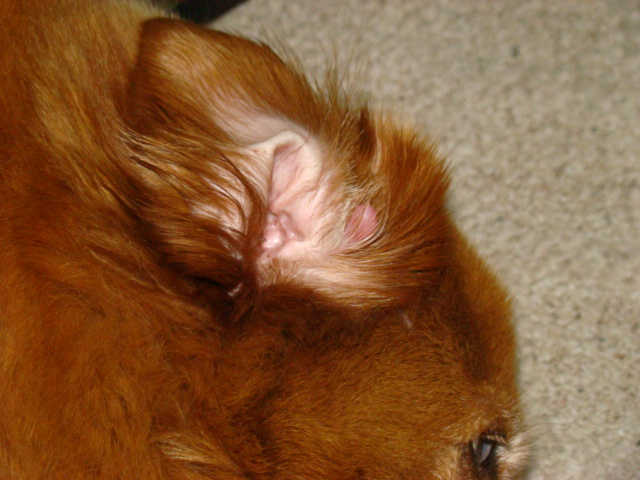 Ear Care
Question
Erins Ear 2
I had my dog groomed two days ago
Ear Care
Question
Erins Ear 2
I had my dog groomed two days ago
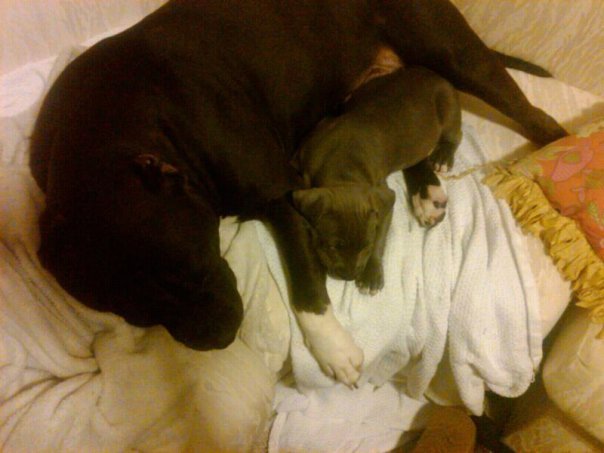 Dog aggression towards puppy
Question
The father and his pup
My older dog is an Amer
Dog aggression towards puppy
Question
The father and his pup
My older dog is an Amer
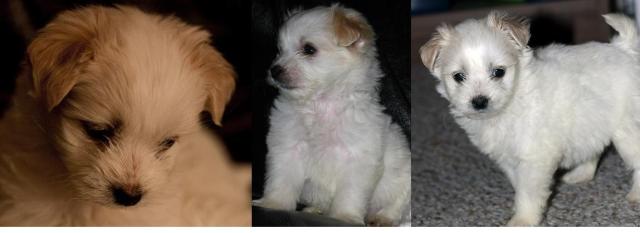 maltese with brown ears
Question
maltese
we bought a dog and owner said its pur
maltese with brown ears
Question
maltese
we bought a dog and owner said its pur
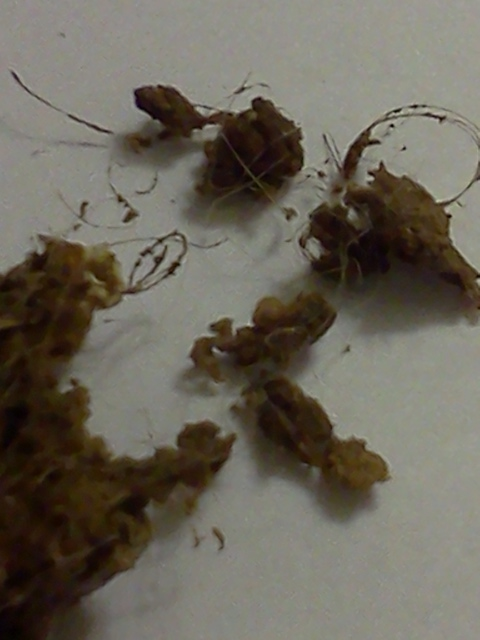 Dog Worms
QuestionDog Poo
Dog Poo
QUESTION: Ive got
Dog Worms
QuestionDog Poo
Dog Poo
QUESTION: Ive got